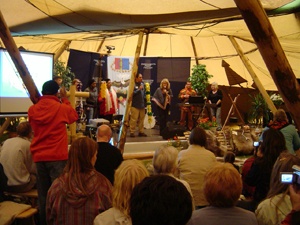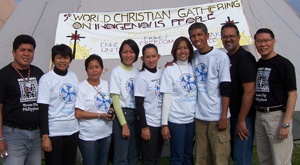|
|
The World Christian Gathering on Indigenous People (WCGIP) is a bi-annual celebration of Christian first nation peoples using dance, music and art as an expression of worship to the great creator. Each gathering includes forums, discussions and workshops on issues concerning indigenous people worldwide.
The sixth WCGIP conference will be held 11-17 September 2006 in Davao City, Philippines. Previous gatherings were held in New Zealand, Australia, Sweden and the United States. Over one thousand delegates from different tribes and nations are expected to attend this year’s event.
The Role of Indigenous People
Indigenous people have a key role in the revival of a nation. As the original inhabitants of the land, they have a spiritual authority over the land that is different from other peoples. Yet most indigenous people have been reduced to minorities and are often neglected and found in the most desolate areas of the world where the poorest of the poor live.
Indigenous people are still considered a great mission field around the world. In recent years God has also been stirring Christian indigenous people to rise up as a mission force themselves. North American Indians, Maoris of New Zealand, Sami People of the Arctic and other Christian indigenous people are penetrating difficult countries with the gospel using culture, dance, music and art as instruments for evangelism. The movement has grown worldwide through these indigenous people gatherings where all cultures are affirmed to worship Jesus Christ. WCGIP encourages the cross-pollination of ideas that can be powerful tools for world evangelization.
One of the hopes for the WCGIP gatherings is for the body of Christ to recognize that culture plays a significant role in the Church movement. Upholding indigenous leadership is important to these gatherings where ceremonial protocols are given great importance. Indigenous people must be treated as co-equals in reaching the world for Christ; they must be able to use their God-given gifts, language, culture, dance and music. The purpose for the gatherings is not to romanticize culture but to give indigenous people the freedom to express themselves to God and use these expressions to reach out to others.
The WCGIP 2006 gathering in the Philippines will have four objectives:
1. To present the unique role of indigenous people in the body of Christ in fulfilling God’s revival and destiny for the nations
2. To discover together how redeemed indigenous culture can be utilized as an expression of worship and as a vehicle for evangelism
3. To identify the hindrances affecting the active participation of indigenous people in the body of Christ
4. To provide a forum to discuss the appropriate Christian response to the prevailing issues concerning indigenous people
![]()
|
|
Indigenous People in the Philippines
The movement to see Christian indigenous people rise to leadership is important to the people of the Philippines. The island has more than 160 people groups with distinct languages and cultures. Despite more than one hundred years of evangelical Christian presence in the Philippines, there are still no indigenous people leaders represented in the Church hierarchy. Tribal peoples were the first converts when Americans brought evangelical Christianity to the Philippines in 1898. Yet tribal Filipinos soon assimilated to Western ways, believing they had to do this to become a true Christian. Anything Filipino was either thought pagan or inferior.
Identity is important to the revival of a country. A transformation with a national scale is not possible without the love for God, country and its people. Centuries of conquests whether by the sword, religion or economies, made the Filipinos who they are today. They have become a seemingly subservient people; they are also the most cosmopolitan people in the world, adapting easily to any foreign language or culture. It is typical to find a Filipino who can speak and understand three languages or dialects. Today, the Philippines is the third largest English-speaking country next to the United States and Great Britain. The cheerful accommodating attitude of Filipinos makes them easily liked in many countries of the world. Yet it is also these positive qualities which have made Filipinos feel inferior to other cultures.
Indigenous roots are part of the identity of Filipinos. God will use his Church to redeem the Filipinos’ calling to the world, but they need to be free. In many ways Filipino churches are still enslaved to other cultures and ideas. The World Christian Gathering on Indigenous People will make Filipinos look back to their indigenous roots and reclaim their identity and true virtues as Filipinos. This gathering of cultures will provide a venue for all peoples in celebrating their oneness in Christ and rediscovering their uniqueness as a people.
For more information on the Sixth World Christian Gathering on Indigenous People visit http://www.wcgip.org/.


